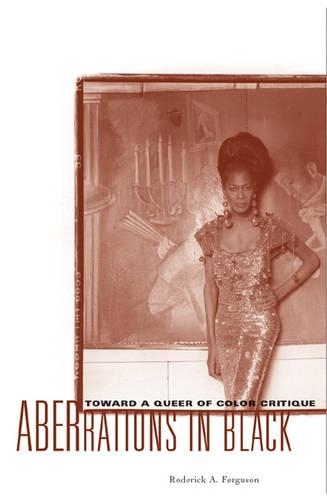
Aberrations In Black: Toward A Queer Of Color Critique
(Paperback)
Publishing Details
Aberrations In Black: Toward A Queer Of Color Critique
By (Author) Roderick A. Ferguson
University of Minnesota Press
University of Minnesota Press
10th December 2003
United States
Classifications
General
Non Fiction
Ethnic studies / Ethnicity
LGBTQIA+ Studies / topics
813.50989607300866
Physical Properties
Paperback
192
Width 149mm, Height 229mm, Spine 10mm
Description
A hard-hitting look at the regulation of sexual difference and its role in circumscribing African American culture
The sociology of race relations in America typically describes an intersection of poverty, race, and economic discrimination. But what is missing from the picturesexual differencecan be as instructive as what is present. In this ambitious work, Roderick A. Ferguson reveals how the discourses of sexuality are used to articulate theories of racial difference in the field of sociology. He shows how canonical sociologyGunnar Myrdal, Ernest Burgess, Robert Park, Daniel Patrick Moynihan, and William Julius Wilsonhas measured African Americanss unsuitability for a liberal capitalist order in terms of their adherence to the norms of a heterosexual and patriarchal nuclear family model. In short, to the extent that African Americanss culture and behavior deviated from those norms, they would not achieve economic and racial equality.
Aberrations in Blacktells the story of canonical sociologys regulation of sexual difference as part of its general regulation of African American culture. Ferguson places this story within other storiesthe narrative of capitals emergence and development, the histories of Marxism and revolutionary nationalism, and the novels that depict the gendered and sexual idiosyncrasies of African American cultureworks by Richard Wright, Ralph Ellison, James Baldwin, Audre Lorde, and Toni Morrison. In turn, this book tries to present another storyone in which people who presumably manifest the dysfunctions of capitalism are reconsidered as indictments of the norms of state, capital, and social science. Ferguson includes the first-ever discussion of a new archival discoverya never-published chapter ofInvisible Manthat deals with a gay character in a way that complicates and illuminates Ellisons project.
Unique in the way it situates critiques of race, gender, and sexuality within analyses of cultural, economic, and epistemological formations, Fergusons work introduces a new mode of discoursewhich Ferguson calls queer of color analysisthat helps to lay bare the mutual distortions of racial, economic, and sexual portrayals within sociology.
Reviews
"Aberrations in Black is a significant contribution to queer of color critique and to black cultural studies more generally."Black Cultural Studies
"Intelligent and cogent critiques. Wonderfully intoxicating readings of canonical sociology. Those interested in engaging how fictions of heterosexuality are transformed into pragmatic policy or in how crucial an understanding of racial discourses is to an understanding of queerness in American life will find Fergusons study indispensable."American Literature
"A thought provoking experience. Ferguson offers insight into the idea of normal and provides deeper study into queer theory, Marxism, feminist theory, and African American criticism and how they all intersect."Altar magazine
"Unapologetically interdisciplinary, thoroughly historicized, and effortlessly theoretical, Aberrations is a refreshing polemic that disrupts some of our comfortably held scholarly grand narratives."Journal of the History of Sexuality
"Aberrations in Black represents an impressive scholarly debut by one of the leading young minds in the profession."Journal of the History of Sexuality
Author Bio
Roderick A. Ferguson is assistant professor of American studies at the University of Minnesota.
